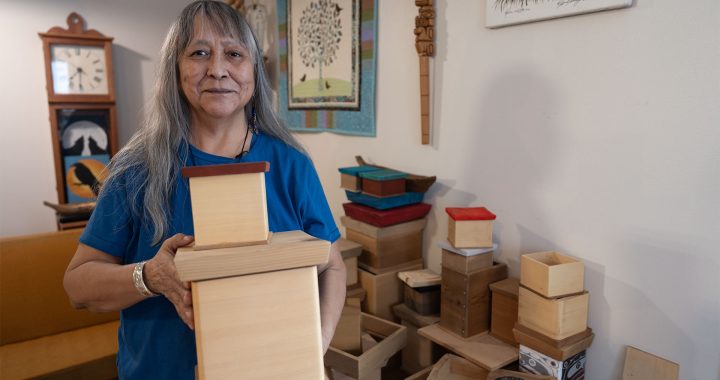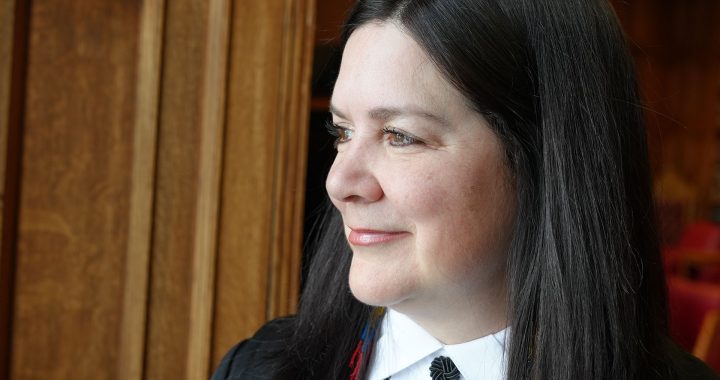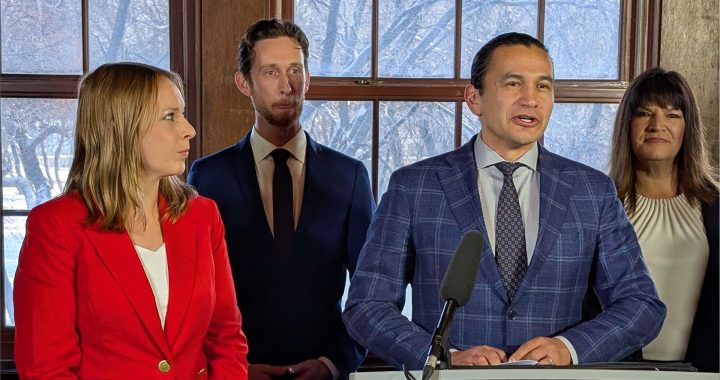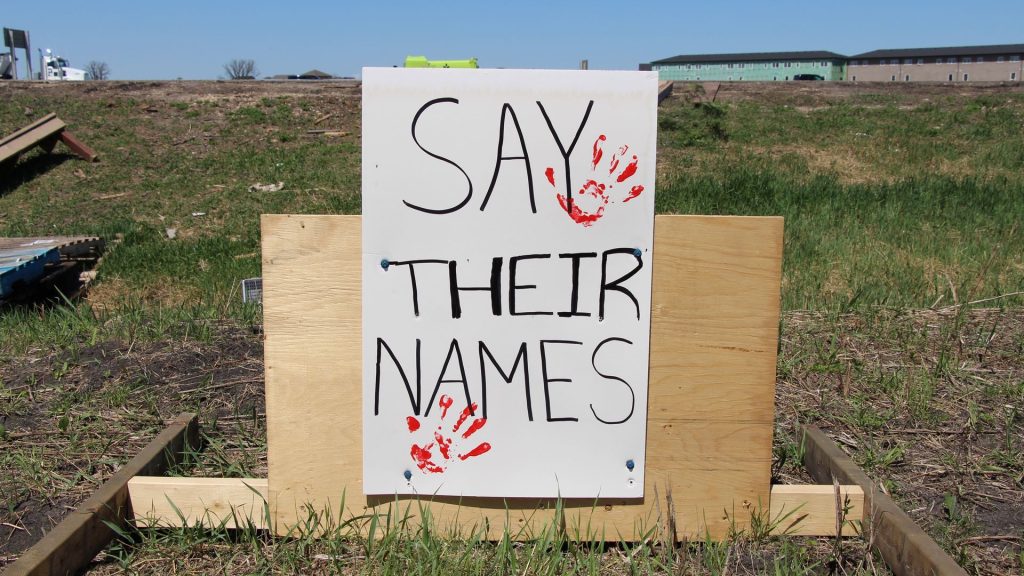
A message with red handprints at the site of Camp Morgan, named for homicide victim Morgan Harris, outside the city's landfill. Photo: Jesse Andrushko/APTN News
Whether it’s landfills or graves, Canada should be prepared to do whatever it takes to reunite Indigenous families separated by death, says the special interlocutor for missing children and unmarked burials at residential schools.
“The state – and I would say the police and the provincial and federal governments – have that responsibility to help the families find the truth,” said Kimberly Murray of Kanesatake Mohawk Territory.
“That sort of truth-seeking is very important and an important similarity.”
Murray is referring to the proposed multi-million-dollar search of Prairie Green, a private landfill outside Winnipeg for the remains of two First Nations women from Manitoba.
Marcedes Myran and Morgan Harris are believed to be victims of a suspected serial killer, who has pleaded not guilty to four counts of first-degree murder. Winnipeg police allege Jeremy Michael Anthony Skibicki killed three Indigenous women and one believed to be Indigenous between March 2022 and May 2022 and dumped their bodies in the garbage.
Only the remains of one of the victims, Rebecca Contois, were recovered from the city-owned Brady Road landfill. Police said the remains of Myran, Harris and a third unidentified person, known as Buffalo Woman, were likely in the Prairie Green Landfill 25 km northwest of Winnipeg.
But police have refused to do the search, citing a low chance of success and a high risk of exposure to toxic materials.
“On a human level no one should have to experience the trauma that the families have had to endure,” said Barry Blue, the district manager of Prairie Green.
“As spokesperson for the site, I can say that Waste Connections of Canada is fully supportive of the findings of the study.”
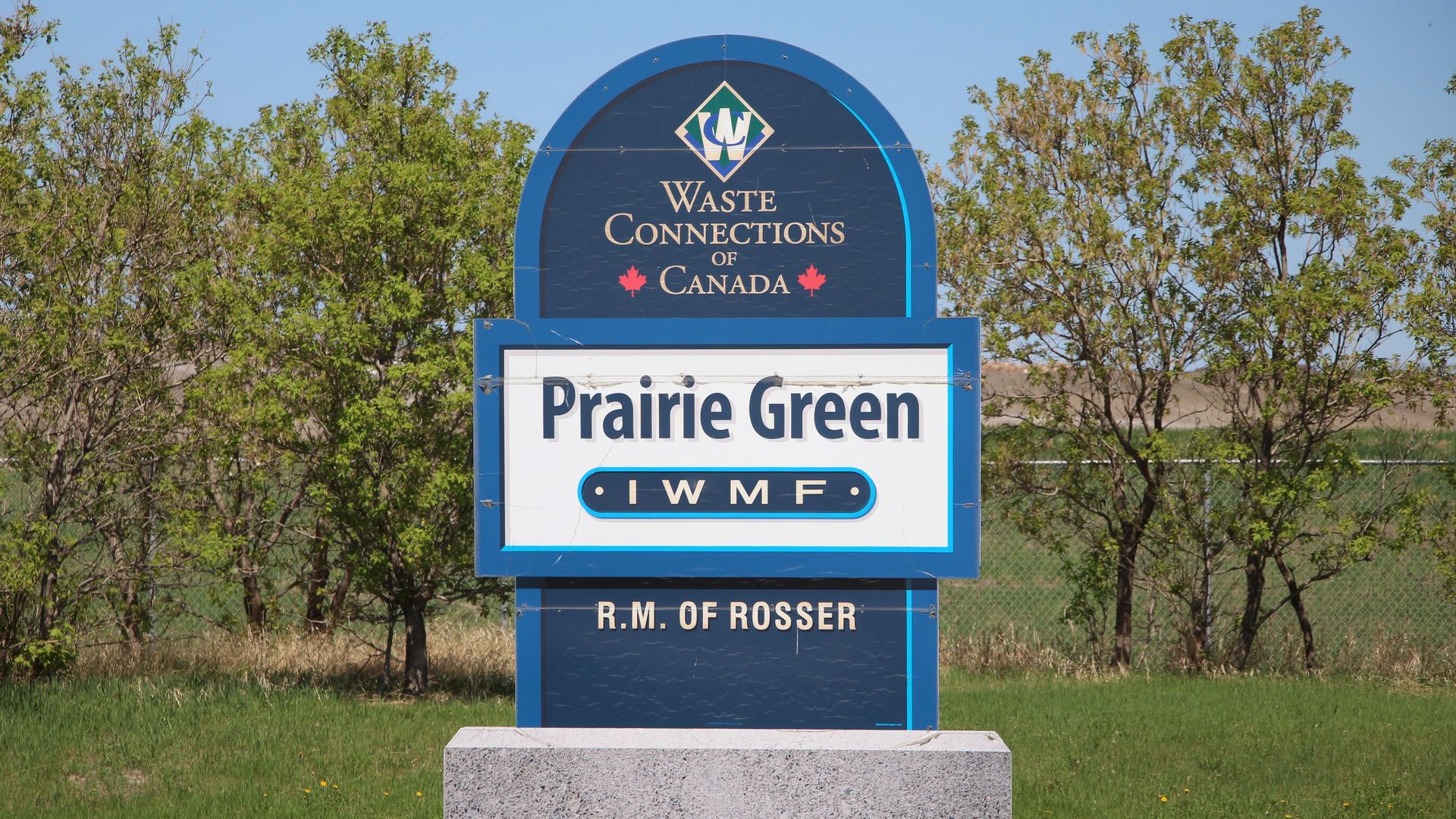
Waste Connections is a multi-national garbage collection company based in Texas that operates landfills and garbage pickup in the United States and Canada. Blue wouldn’t say if the company has dealt with other searches for human remains, how the search would impact its Manitoba operations, or whether it would seek financial compensation in the event of a closure.
He did say the Myran and Harris families have the company’s support.
“We will continue to work collaboratively and in harmony with the recommendations of the feasibility study,” Blue said in an email.
The 55-page study led by the Assembly of Manitoba Chiefs (AMC), a political advocacy group, was paid for with $500,000 from the federal government and has not been released publicly. It recommends going ahead but does not guarantee an outcome.
There is no word on who would foot the estimated $84- to $184-million bill for one- to three years of searching.
“We just don’t have the financial resources to participate in a search at the City of Winnipeg…,” said Mayor Scott Gillingham.
“It would have to be senior levels of government – in this case, the federal government – and I’ve been clear about that.”
Gillingham told APTN News he has discussed the search with provincial and federal politicians but his municipality can’t afford to pay even part of the tab.
“Our funding is very limited, our resources are just very limited.”
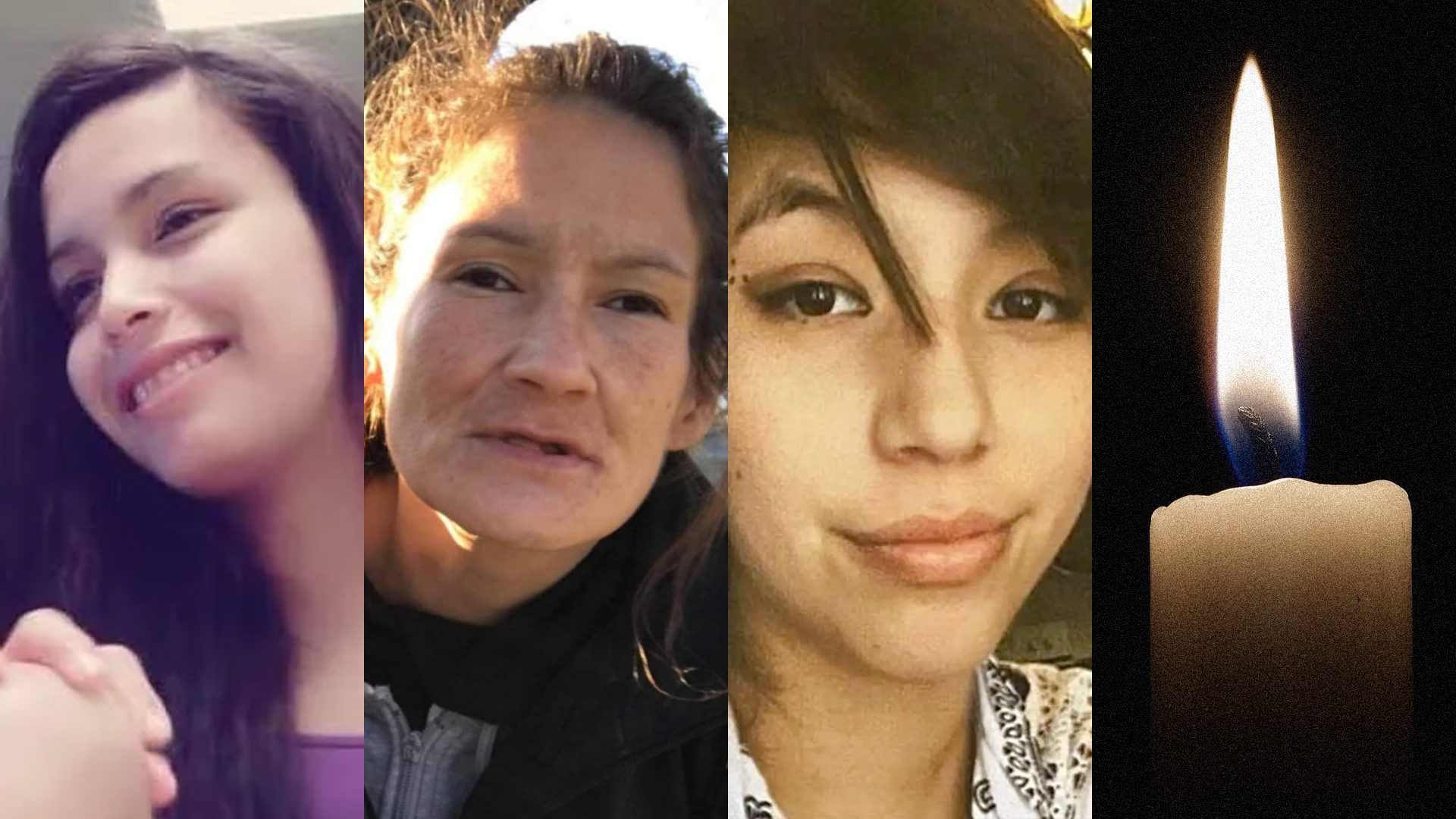
The province of Manitoba wasn’t ready to talk about a financial commitment when contacted by APTN.
“Our hearts continue to go out to the families, communities and all Manitobans impacted by these tragic losses,” said an email from a spokesperson for the Department of Indigenous Reconciliation and Northern Relations.
“We will take the time necessary to properly review and consider the report, being mindful of the integrity of the ongoing justice process, so important to the families and all Manitobans.”
Murray, the former executive director of the Truth and Reconciliation Commission, was appointed to oversee residential school grave searches after the discovery of what could be the remains of 215 children near the former Kamloops Indian Residential School in 2021.
The Trudeau government committed $10 million over two years to fund her role. And pledged a further $210 million over five years to help communities find, document and preserve burial sites, as well as construct a new building for the National Centre for Truth and Reconciliation.
Murray said there are important similarities between both searches.
“The families of the women probably have the same goal as the families of the children that never were returned home from Indian residential schools,” she said in an interview.
“They have the need and desire to bring honour, respect and dignity to those women – and their spirits – because, clearly, that is not how their life ended.”

They share the need to know the truth of what happened to their loved ones, Murray added.
“They have not only a need to know but they have a right to know,” said the lawyer. “It is an internationally recognized right of victims of human rights abuses and mass atrocities.
“You have a right to know what happened.”
A three-page executive summary of the feasibility study released by AMC recommends hiring Rocky Mountain Forensic Consulting Services Inc. of Alberta to search Prairie Green for evidence with the aid of an industrial-strength conveyor belt.
It’s the same process the B.C. RCMP used to investigate now-convicted serial killer Robert William (Willy) Pickton.
“Project Evenhanded cost $120 million,” said Staff-Sgt. Chris Clark, senior media relations officer for the B.C. RCMP.
“The majority of those costs (83%) are associated to the cases connected to Pickton which accounted for $100 million dollars,” Clark wrote in an email.
He said, “70% of those costs were borne by the Province and 30% by the Federal Government as per the RCMP Police Services Agreement for contact policing.”

The Pickton farm that was searched for evidence outside Vancouver in 2002 was the biggest crime scene in Canadian history. It was also “the largest and most complex investigation undertaken by the BC RCMP in policing history,” noted Clark.
“The majority of costs were incurred during the extensive search of the Port Coquitlam property. Other significant costs were incurred as part of infrastructure and technology advances in the RCMP labs, the hiring of anthropology students, disclosure requirements, and trial preparations associated with Pickton.”
The cost of Project Evenhanded included:
- Police salaries (including OT and pay & benefits) for RCMP and Municipal Police
- Infrastructure required at search sites
- Securing of exhibits and evidence
- Forensic examination and expertise
- Trial preparation and witness support
Clark declined to answer additional questions, such as what expertise the RCMP could provide to police and searchers in Winnipeg.
“Respectfully, we will decline to provide further comment beyond what is publicly available/previously reported as we are mindful of the ongoing stakeholder discussions with respect to the Winnipeg landfill search, as well as any related, ongoing criminal investigation or process,” he said in an email.
Kris Dueck, the founder of Rocky Mountain Forensics, was a member of the RCMP for seven years. It’s not clear if he was part of the Pickton investigation.
His company’s website and personal LinkedIn profile don’t say whether he has searched a landfill for human remains before.
When contacted by APTN, Dueck referred questions to AMC Grand Chief Cathy Merrick.
“All communications related to this issue are properly directed to the Assembly of Manitoba Chiefs Communications Team, and which has been cc’d on this response,” he said in an email.

Cambria Harris, the eldest daughter of victim Morgan Harris, told APTN the feasibility study contains sensitive information the families don’t want released.
She also said some technical information needs to be kept private.
When APTN asked for a redacted copy of the report that would black out sensitive information it was refused.
“Thank you for your emailed request, but currently, we will not be making the report available to the public,” said the AMC Communications Team in an email.
A copy of the study was leaked to one media outlet, AMC confirmed in a news release.
Members of the Landfill Search Feasibility Study committee made up of an oversight committee and a technical subcommittee, received copies of the study after signing a non-disclosure agreement that threatened legal action if violated, APTN has learned.
The Winnipeg police are part of the advisory committee.
A spokesperson for Marc Miller, minister of Crown-Indigenous Relations, said the federal department is reviewing both the feasibility study and AMC’s proposal to search the Brady landfill for the possible remains of other missing and murdered women.
“We will provide more comments when it is appropriate to do so, after our review,” said an email. “We need to make sure our work is done right, in a culturally-sensitive and trauma-informed manner, and keeping at heart the families, survivors, and communities.”
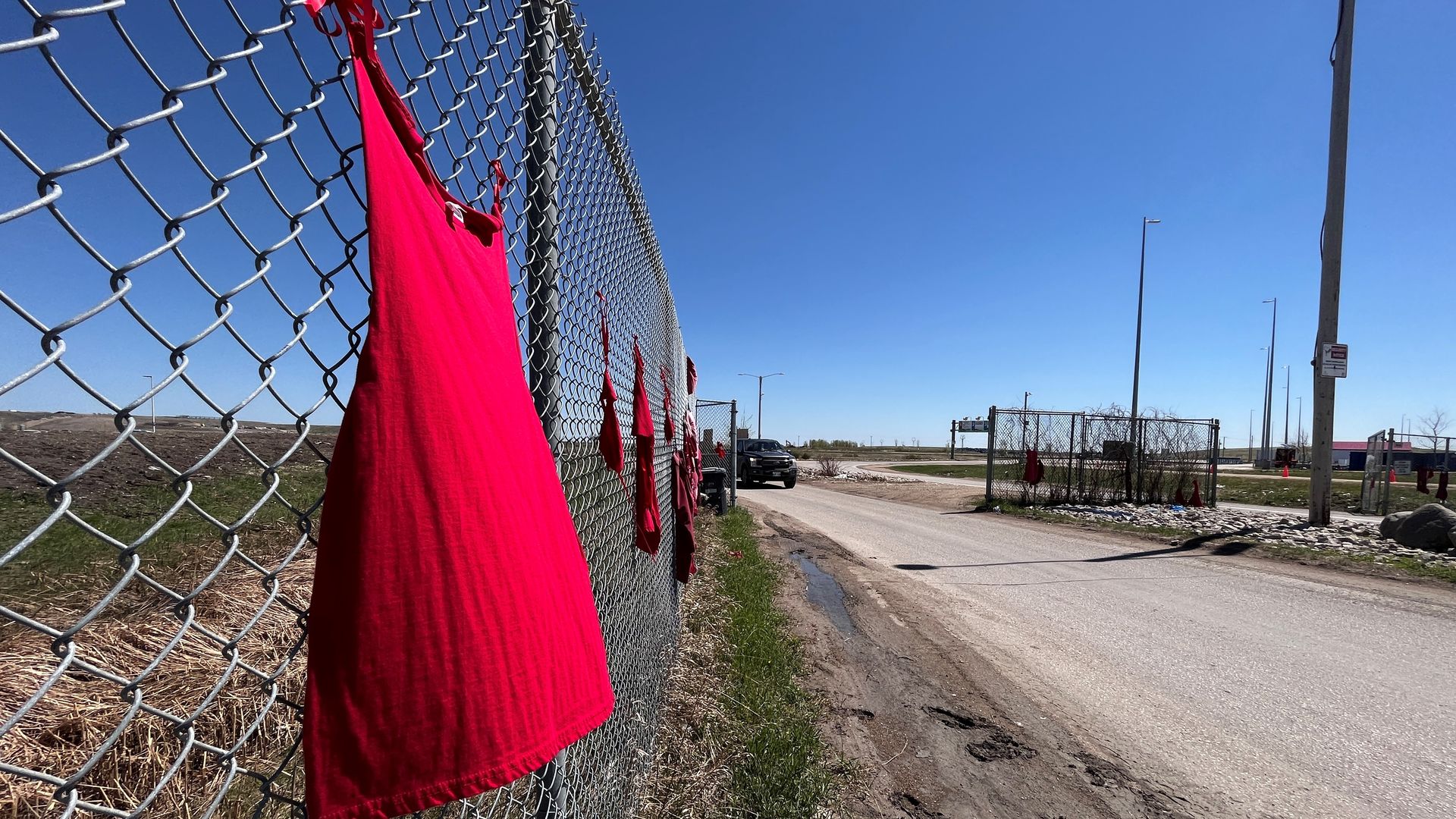
Cambria has said no price can be put on the search and likened ongoing violence against her mother and other Indigenous women to genocide caused by colonial attitudes and systems that oppress Indigenous peoples.
“It doesn’t matter the cost, it matters the people,” said Cynthia Cardinal, whose sister Georgina Papin was identified through DNA retrieved through the Pickton farm search.
“Our women are worth it.”
Cardinal said it was important that the Myran and Harris families have access to counselling, elders and community support.
“We had trouble with victims’ services unable to handle the families’ needs. At one point, families were warned to stay away from us because we weren’t good people,” she said from Edmonton.
“Other families told us and we were so hurt. Don’t let them separate the families because they need each other.”
Pickton was charged with murdering 26 women, convicted on six charges and sentenced to life in prison.
He claimed to have killed 49 women, many of whom were poor, addicted, homeless and Indigenous. But Vancouver police denied a serial killer was at work.
The case highlighted the wider issue of missing and murdered Indigenous women and girls. It also shone a light on “blatant failures” by the police.
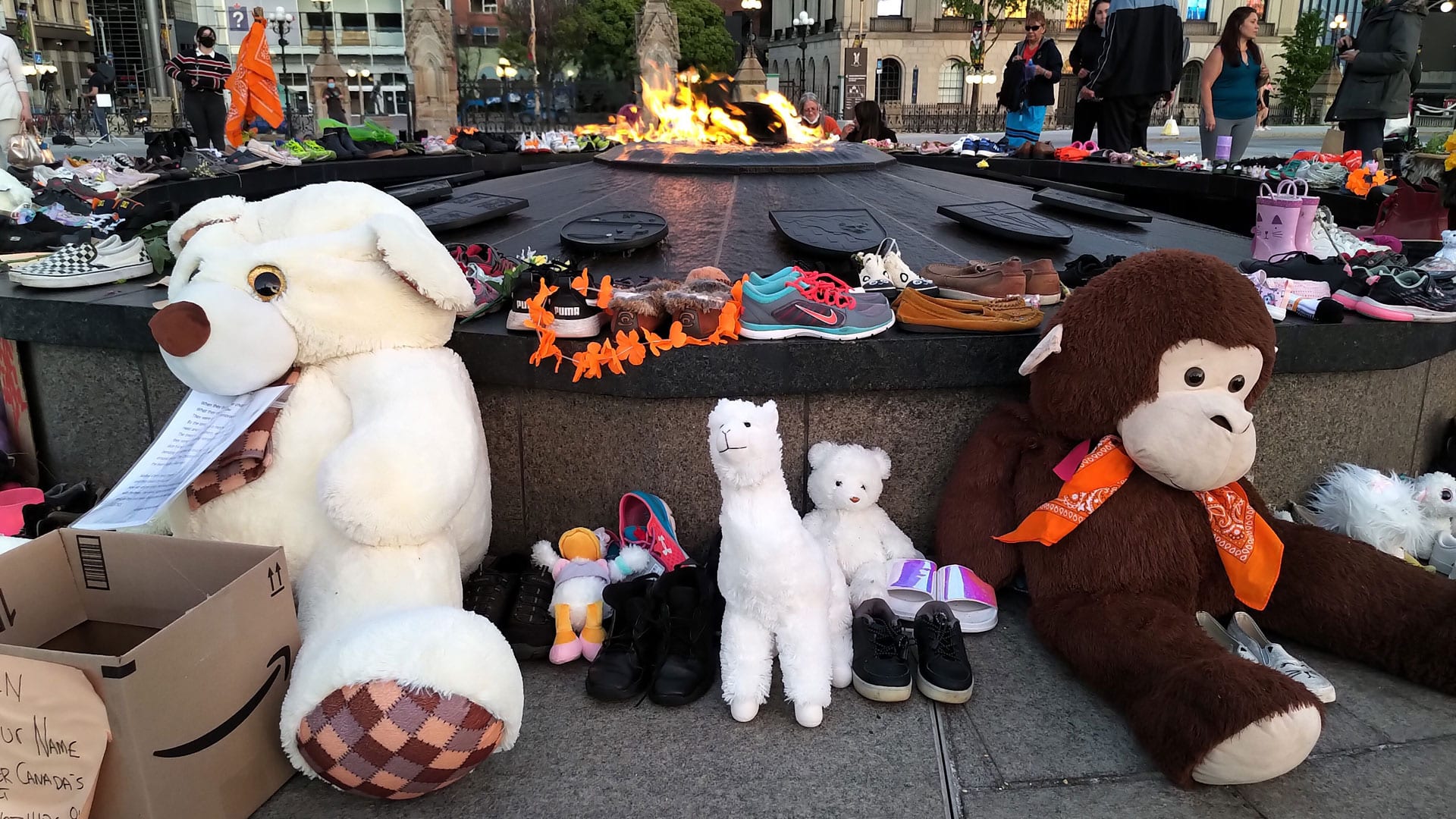
For Murray, it is another similarity with the Winnipeg search and the children reported missing from residential schools.
“There is mistrust, for good reason, of the police that are tasked with doing the investigation or aren’t doing the investigation and aren’t trying to do the investigation,” she said.
“This is about justice and accountability, and how our colonial legal system hasn’t delivered justice to Indigenous people and has failed communities and families.”
Skibicki’s trial is scheduled for April 2024.
With files by Leanne Sanders, Danielle Paradis and Darrell Stranger







